- Home
- Margaret Mahy
The Changeover Page 10
The Changeover Read online
Page 10
"I have been giving your brother's situation some thought," said Winter Carlisle. "Sorensen — help Laura to her chair."
"I'm all right!" Laura said in astonishment. "I can sit down myself." Such courtly manners were part of an alarming foreign ritual. There were girls in her class at school who had boyfriends they slept with, but not one of them behaved particularly nicely to the girls. Any boy who was publicly good-mannered, unless forced to be, was doomed to scorn, for everyone, in Laura's class at least, knew it was boys against girls in the world, and good manners were either a surrender or part of a trick, a manipulation, and deserved nothing but contempt.
"Be that as it may, Sorensen can be civil in order to make me feel comfortable," his grandmother said. "We are a fond family rather than a loving one, so consideration is doubly important. We can't afford to abandon it as loving families may choose to do out of confidence in themselves. Now, Laura— perhaps in a confrontation I might be a match for your Mr Braque, but I can't make him take his mark off your brother unless I get a certain power over him. Sorensen is right in thinking we should put a mark on Mr Braque in order to get that power, and that it will be a very difficult thing to do.
"It's not very different from casting the runes," Winter continued. "In the past, many magicians cast the runes. In Australia, the tribal magician points the bone and his victim withers and dies. The mark used by Carmody Braque is the same sort of thing. It is a mark of possession and has become a door into your brother, through which Mr Braque can come and go at will. He could give, but he chooses to take. He knows his own power and he would recognize ours. He wouldn't put out his hand to Miryam or me or even Sorensen."
"My mother says Jacko is terribly ill," Laura said.
She did not have to say, "Isn't there anything, anything, that can be done to help us?"
"There would be no danger," said Winter casually, "if you were a witch yourself."
Miryam smiled at Laura. Sorry lifted his silver eyes to look thoughtfully at his grandmother.
"You want to work a changeover?" he asked.
"Why not?" Winter asked back.
"It c-could kill her," suggested Sorry.
"Oh, no — surely not!" Winter replied quickly. "She's half way there, isn't she? You must admit it. You feel it yourself." She turned back to Laura. "As you know, you're what we call a sensitive, my dear. You stand on the threshold of our condition, and we can invite you in — Sorry, Miryam and I. We could help you to make a witch of yourself. Common nature, which trembles a little before you now, would let you in. And then we think that, if you found a way to mark Mr Braque, you would — what was that phrase, Sorensen?"
"Rupture his integrity," Sorry concluded.
"I don't think he's got any integrity," Laura exclaimed. "I think he's just horrible all through."
"His wholeness!" Sorry said. "The way his system holds together in one piece! We think he might begin to fall to bits if you put a mark on him. He's very old by the sound of it and it gets harder and harder to maintain an unnatural body."
"If I was a witch he'd recognize me too, wouldn't he?" Laura asked. "Carmody Braque, I mean." There, in the centre of the table, was a perfectly ordinary milk jug. The dishes at her elbow were dirty in an ordinary way. They helped her to be matter-of-fact about this extraordinary suggestion. Sorry stared at his grandmother as meditatively as if she had simply proposed Laura approach Mr Braque dressed in her best clothes,
but Winter had actually suggested she become a witch.
"He might do so," Winter said, "but you see he knows you. He's met you. He already knows you are not a witch. Now, if you wore dark glasses so that he could not look into your eyes (for they can be very treacherous windows, eyes can) and some one of us, Sorry perhaps, went with you and was recognized as a witch, we think it very probable that you yourself would not be suspected. Your own changed state would be masked. You would then have to talk him into accepting something from you, or trick him into wanting to take it... anything to make him put out his hand. And once you have marked him it is important then that he should recognize you and know exactly what you are and what you intend."
"Would I be able to change back from being a witch?" Laura asked.
"No!" said Sorry. "You can only make one changeover in your life."
Laura frowned to herself.
"It's hard to imagine," she said. "You seem different, but you don't act differently from any other family. What do witches do?"
"We're like scientists," said Sorry. "We compel nature — move it around according to our wishes — but scientists use rules that they've worked out through thought, and ours comes through imagination, I suppose."
"... and exchange," Miryam agreed. "The scientist reasons and then, by experimental or industrial processes, applies his reasoning. The price that's paid for altering nature is often paid outside the scientist himself, but witches, when they institute a change, bleed something of themselves out into the world. It builds up again, but it takes time — seconds, hours, days ... changing the weather can take a long time to recover from and even then it's no use trying to make it rain if there isn't a rain cloud in sight. Or we can dip into the future a little, but only blindly. Sometimes it's useful, sometimes ..." As she spoke Sorry lifted up his hand, the air twisted above it and a moment later a kingfisher was sitting on his finger clicking its beak but otherwise seeming quite unperturbed. "Not that any of this solves Chant's problem," he said, staring at it in astonishment. "Suppose she doesn't want to change over?"
"She doesn't have to make up her mind immediately," Miryam said in her calm way, "though you should decide within twenty-four hours, Laura."
"The hospital might work out a cure," Laura suggested, and encountered a look from Sorry that was distinctly harassed — the bare beginning of an apology for the suggestion his grandmother had made. Something about it had troubled him in a way he did not want to admit. Finding himself noticed by her he turned his head away to look at the kingfisher, which vanished a moment later as mysteriously as it had come.
"Was it from the future?" she asked, and he nodded.
"But not very far in the future," he told her. "Not much over a day. It'll fit in somewhere."
"Don't give yourself a headache," said Winter warn- ingly. "He's showing off," she added to Laura. "A materialization like that, even though it is only a little thing, is quite hard to achieve and very wearing."
"It was really beautiful," Laura said. "Like getting a little present from tomorrow."
"Sorensen has a real affinity with birds," Miryam said, and for the first time Laura heard a note in her voice that suggested she might be proud of him in her own cool way. But Sorry looked into space as if he half expected it to punish him for taking liberties, and said very little for the rest of the evening.
Laura's bedroom was upstairs, looking out over the courtyard with its leafy population of birds and chessmen in the form of topiaries. From her window she could see the wood, the last remnant of Winter's farm, and through its leaves and branches the occasional light of the Gardendale subdivision, quite as pretty as Christmas lights, set among the poplars and birches. Though she knew this was a beautiful and mysterious house of numberless rooms, she was briefly homesick for the noise of traffic, the dangerous streets, even for the Supermarket from Outer Space, all part of the happy year now breaking up around her, becoming something to be remembered, not a time she was actually inhabiting. She pushed the bolt on her door, wondering if she was, perhaps, frightened of Sorry, and deciding that really what she wanted was to feel contained, shut off with her own thoughts, away from all the seductions and persuasions of the Carlisle witches.
"Chant!" said Sorry's voice urgently in her ear, and she woke, startled, to find she had been sleeping. The darkness was thick and soft as if she had been wrapped in fur.
"What do you want?" she cried, really frightened now, first by the darkness and the unfamiliar room that lurked beyond it and then by Sorry's voice somewhere close to
her face.
"Shhh! Don't be scared!" he said. "I haven't come to ... I don't mean any harm. Listen, don't let Winter con you into anything, will you? She's a tough proposition, old Winter, and she always thinks of her own advantage first. Don't let her work a changeover on you unless you are quite sure it's the only way to save your brother — and even then — make sure it's what you really want to do. Don't give in without making her tell you whether or not there's an alternative. She will tell you honestly if you ask her, but make sure you ask her."
"Is it so terrible — being a witch?" Laura asked, sitting up in bed. She put out her hand in the dark and after a moment touched Sorry's face.
"No— it's not terrible, but it separates you off," he said. "You mightn't want to be stranded over here with Miryam and Winter and me."
Listening to his voice in the dark, Laura found herself remembering the exact feel of his hand in the touch at once intimate and remote earlier that evening, and to her astonishment wanted to feel it again so that she could think carefully about it. She touched his face in the dark like a blind girl trying to find out what expression he was wearing.
"How did you get in?" she asked. "I bolted the door." She felt him smile.
"Very sensible," he said, "but it's a poor witch that can't go through a door."
"Aren't you pushing it a bit far?" Laura asked sternly. "I think what you've been doing to me counts as sexual harassment."
"You've been reading Woman's Weekly," Sorry replied. "Never mind — as harassment goes I expect it's the best sort there is."
"It's not fair!" Laura hissed.
"Fair!" Sorry answered. "You know what you can do with 'fair'! Besides, one way and another, I didn't think you'd mind. I thought we could take a short cut perhaps. You don't want to go through all that 'getting to know you' bit, do you?"
"I don't know," Laura said. "I don't know anything about that. I've never been out with a boy. Have you— with a girl, I mean?"
"Do you want a reference?" Sorry asked.
Laura's hand still touched his face.
"Have you ever been to bed with a girl?" she asked, and he was silent. "Have you?" she persisted.
"Not here," he said at last.
"Did you like it?" she asked. "Was it like it is in the last five lines of a Barbara Cartland?"
"It was nice in bits," Sorry said. "As a matter of fact I got into a hell of a lot of trouble over it. But then I might have been the villain, not the hero. If only I knew for sure."
"What's it like being a witch?" Laura asked.
"Nice in bits," he said again. "Sometimes the two things seem to go together. Listen — I'll show you — I'm very good you know. Think of some place— some place you remember as wonderful." Before Laura could stop it a certain memory came into her mind.
"Not that!" she was about to say, but Sorry said, "Got it!" as if she had passed him something in the dark, and the room began to lighten towards the window.
"Nature is like a holograph in some ways," he said. "Any part contains the whole picture."
Just for a moment Laura was looking into something like a peephole no bigger than a small coin, the next moment a most peculiar sensation overcame her, as if she had suddenly been asked to contain a memory of every place in the world. Whatever she named she saw, what she saw she struggled to name, not one ocean but all oceans, deserts of ice, coloured only with sunrise, sunset and the shifting lights of the aurora, sand sifting to the very boundary of sight. Somewhere in the flesh of the earth the dreadful earthquake shuddered, the tide walked to and fro on the leash of the moon, rainbows formed, winds swept the sky like giant brooms piling up clouds before them, clouds which writhed into different shapes, melted into rain or darkened, bruised themselves against an unseen antagonist and went on their way, laced with forking rivers of lightning, complete with white electric tributaries. Out of this infinite vision an infinity of details could be drawn, but Sorry had settled on one, and from the endless series a particular beach was chosen and began to form around Laura — a beach of iron-dark sand and shells like frail stars, and a wonderful wide sea that stretched, neither green nor blue, but inked by the approach of night into violet and black, wrinkling with its own salty puzzles, right out to a distant, pure horizon.
Laura had once, many years before, visited this beach with Kate and her father. Now she smelt the strange smell of salt, mingled with the organic scents of rotting seaweed, and of sand, alive with more lives than she could begin to number.
"That's restful," Sorry commented. "Sweet dreams, Chant. See you tomorrow."
He was gone, and Laura, both disturbed and comforted, watched the waves break on the curving sand and went to sleep again at last.
In the morning she woke early to the song of many, many birds and went down through the old house, still and empty at that hour of the morning, its rooms inhabited only by the abstract brownish-gold of early sunlight. Then a noise drew her out of the back door and she found Sorry himself, squatting half-naked before his motorbike doing some unexplained maintenance.
"I made some coffee a moment ago," he said as casually as if he were used to having her around. "There should be enough for you, too. It's still hot, if you hurry."
Laura found the coffee and came out to sit on the step and watch him.
"Doesn't your bike go?" she asked after a moment. "I need to get home and put on a clean shirt."
"Have one of mine," Sorry said. "No, I suppose it would be a bit too big. OK. She's jake! Give me ten minutes and I'll be able to take you home and check the bike at the same time."
Laura sat on the step, leaning back against the door, and felt for the first time completely comfortable in Sorry's company. Later, she climbed on to the back of the bike with the skill of increasing experience, and they roared off down the drive, opened the gate, closed it again, and came out of the enchanted world of Janua Caeli into the Gardendale subdivision. There it lay, innocent, and sleeping its Sunday morning sleep, streets almost totally empty, houses washed over with early, tawny light, but beginning to turn pink along the ridges of the roofs and the rims of the narrow chimneys.
Laura saw with amazement Chris Holly's car outside their gate.
"Sorry," she said climbing off and standing beside him, "that's Chris Holly's car."
"Is it indeed?" said Sorry in a disinterested voice.
"Kate went off in it," Laura frowned uncertainly. "She must be back — something's wrong."
"Something's still wrong with this bike," Sorry said. "I'll tell you what— jump back on it and we'll have a little burn up round by the estuary and pick up your shirt on the way back. Anyhow, it's very early. Your mother might appreciate not being woken."
"You don't understand..." Laura cried scornfully. "All I want is news of Jacko ..."
"No, you're the one that doesn't understand ..." Sorry exclaimed almost desperately and at that moment, almost as if given a cue in a play, Chris Holly opened the door and walked down the path to collect the milk. At the gate he glanced around rather selfconsciously. He was wearing Kate's good raincoat which was very long, and his feet were bare.
Almost at once he saw Laura and Sorry staring at him.
"Damn!" muttered Sorry mostly to himself. "Don't take it to heart, Chant. Stay cool."
Laura was more than cool. She climbed back on to the Vespa and said very coldly, "Let's go somewhere else."
"It's none of my business," said Sorry, "but I don't think you should take it seriously. It's nothing really."
"Laura ..." exclaimed Chris Holly uncertainly, looking appalled.
"Go at once!" Laura commanded and thumped Sorry on the back. He nodded, and they shattered the early morning silence tearing off down Kingsford Drive.
8 Changing for Ever
"It's not so dreadful!" Sorry said, sounding rather bored. "Your mother thought she might feel more cheerful if she spent the night with Chris. Well, why not? I'm in favour of anything that makes people feel better about bad times."
&nb
sp; "Jacko's so sick," Laura said, but Jacko's sickness was only part of the reason for her pain.
"It won't make him any worse," Sorry said, "and it might make her feel better."
"You don't understand about things like this," Laura cried. "You haven't got a heart."
"Lucky me!" Sorry replied. "But it doesn't mean that what I'm saying isn't true."
It was going to be a very hot day. They were walking along one of the tracks around the estuary where the city's river, after turning through ranks of houses and small factories, met the sea and fell under the influence of the moon. The hills were on their left, the water on the right, though as the tide was out there was more mud than water. Ahead of them were two lakes, settling ponds for a sewerage system speckled with ducks, black swans and geese, and reflecting the jagged rim of the hills as exquisitely as less ambiguous water.
"You'll forget it," said Sorry, trying again. "Forget it now."
"I won't!" Laura said, with sullen determination. "I'll never forget it."
"Well no, perhaps not totally forget it." Sorry grew increasingly perplexed and irritated. "You'll just stop thinking about it. Other things will happen and you'll start thinking about them instead, so you might as well stop thinking about it now." He took off his jacket as he spoke, so that the sun fell on his back and shoulders. They came round a bend in the path and looked into a bay where the film of water, no thicker than a sheet of paper over the mud, nevertheless reflected the morning light with an intense silver whiteness, but as they walked towards the shining expanse, a gust of warm wind blew across the bright surface and it vanished, turning suddenly grey. They disturbed a heron sitting on a partially submerged log, and it rose and flew past them sinking its head on its breast as its flight settled down, trailing its long legs behind it. Laura wished she could fly off alongside it, and then dissolve into the honey-coloured air like sugar under the warm stirring of the wind, and never have to feel anything again.

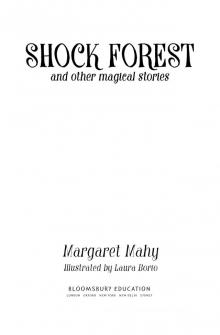 Shock Forest and other magical stories
Shock Forest and other magical stories The Riddle of the Frozen Phantom
The Riddle of the Frozen Phantom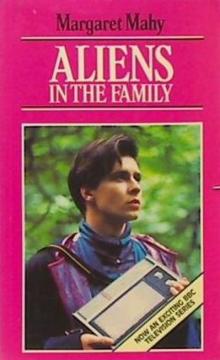 Aliens In The Family
Aliens In The Family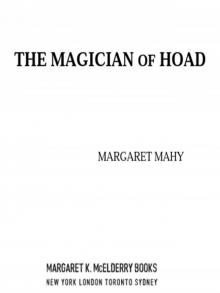 The Magician of Hoad
The Magician of Hoad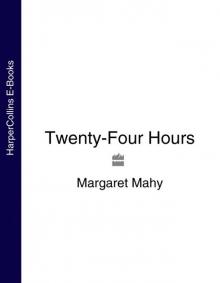 Twenty-Four Hours
Twenty-Four Hours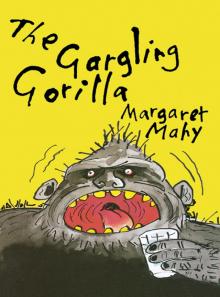 The Gargling Gorilla
The Gargling Gorilla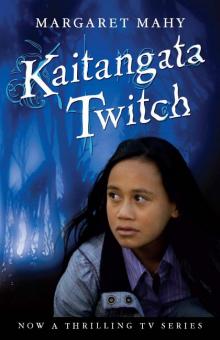 Kaitangata Twitch
Kaitangata Twitch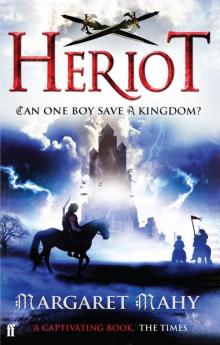 Heriot
Heriot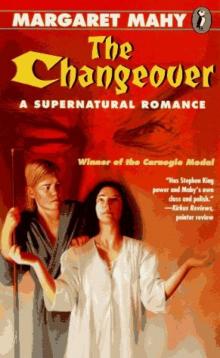 The Changeover
The Changeover